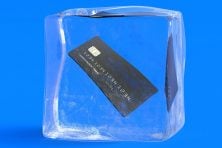Dear Penny: Am I Nuts to Take Out a Mortgage on the Home I Just Paid Off?

I recently paid my mortgage off. This was a lot of hard work and sacrifice over the years. (I had refinanced to a 15-year, so the payment was pretty high.)
I am wondering if I should now finance the house to: have interest to deduct on my taxes (no other deductions, as I make too much money for most things), get money out for home repairs (I need a new HVAC and want to upgrade some things) and to keep having accounts on my credit report. Or, should I just keep stocking the money I used to pay into a savings account?
I have already increased my 401(k) contribution. I have over 10 years before I can retire. I don’t have the greatest credit but it’s also not terrible.
— K.
Dear K.,
Financing a paid-off home to get a tax deduction or have active accounts on your credit reports is a hands-down no, for reasons I’ll explain in a moment. In some circumstances, using your home equity to pay for upgrades could make a bit more sense. But if you’re able to stash away enough cash to pay out of pocket, that gets my vote.
Before I go any further, though, let’s talk briefly about your options for financing a paid-off home. If you want to obtain a new mortgage using your home equity, you can do what’s called a cash-out finance. Typically, cash-out finances are used to refinance an existing mortgage. You could also obtain a home equity line of credit (HELOC) that you could borrow against as needed. With either option, you can only deduct the interest you pay if it’s used for capital improvements, which are improvements that enhance the home’s value, increase its longevity or adapt it for new uses.

Ask Dear Penny!
Get practical money advice from Dana Miranda, the voice of Dear Penny and a Certified Educator in Personal Finance.
DISCLAIMER: Questions will appear in The Penny Hoarder’s “Dear Penny” column. We are unable to answer every letter. We reserve the right to edit and publish your questions. But don’t worry — your identity will remain anonymous.
But it makes zero sense to pay interest just so you can deduct the interest for tax purposes. Suppose you took out a 30-year fixed-rate mortgage for $200,000 at 6% interest. In the first year of a loan, you’d pay nearly $9,000 in interest. Let’s say your marginal tax rate is 22%. You’d pay $9,000, but your tax savings would be just $1,980 (22% of $9,000), and that’s assuming you used all the money for capital improvements.
I should also point out that to deduct interest, you have to itemize on your tax returns instead of taking the standard deduction. But the Tax Cuts and Jobs Act of 2017 essentially doubled the standard deduction, which means that far fewer people benefit from itemizing. For 2018, the first tax year in which the new law was in effect, 87% of taxpayers took the standard deduction. (I’m not sure why, but a lot of people seem nostalgic for the days of itemizing, even though taking the higher standard deduction saves you money and makes tax time far less complicated.)
You also cite the need to have activity on your credit reports as a reason for securing financing. It is true that you want active accounts. Otherwise, you may end up with no credit score. But there are far simpler ways to do this. The simplest (and much cheaper) solution is to open a credit card and pay it off each month.
All that said, tapping your home equity could be a decent option if you plan to upgrade your home and don’t want to pay out of pocket. Keep in mind, though, that interest rates have risen significantly, so your borrowing costs will be higher compared to a year or two ago. I’d recommend opening a HELOC so you can borrow against your home’s value if you need to without taking on a new mortgage.
Having that open line of credit will also boost your credit score as long as you keep the balance relatively low and make on-time payments. You could plan to pay for the upgrades in cash to avoid paying interest but keep the HELOC open just in case you need it.
Paying off your mortgage is a huge accomplishment. There’s a reason some people hold mortgage-burning parties. Be extra cautious about borrowing against your home equity — and under no circumstances should you do so solely for tax or credit-reporting purposes.
Robin Hartill is a certified financial planner and a senior writer at The Penny Hoarder. Send your tricky money questions to [email protected].
- Dear Penny: I Refuse to Sign My Boyfriend's $5,000/Month Mortgage. Am I Wrong?
- Dear Penny: Can I Stop My Ex-Wife From Claiming Half My Social Security?
- Dear Penny: Do I Have to Pay Mom's Debt With My $1M Life Insurance Payout?
- Dear Penny: My Dad Says I Owe Him $400/Month When He Retires. Is This Fair?
- Dear Penny: Should I Date a Man Who Vows He'll Leave Me Penniless When He Dies?


















